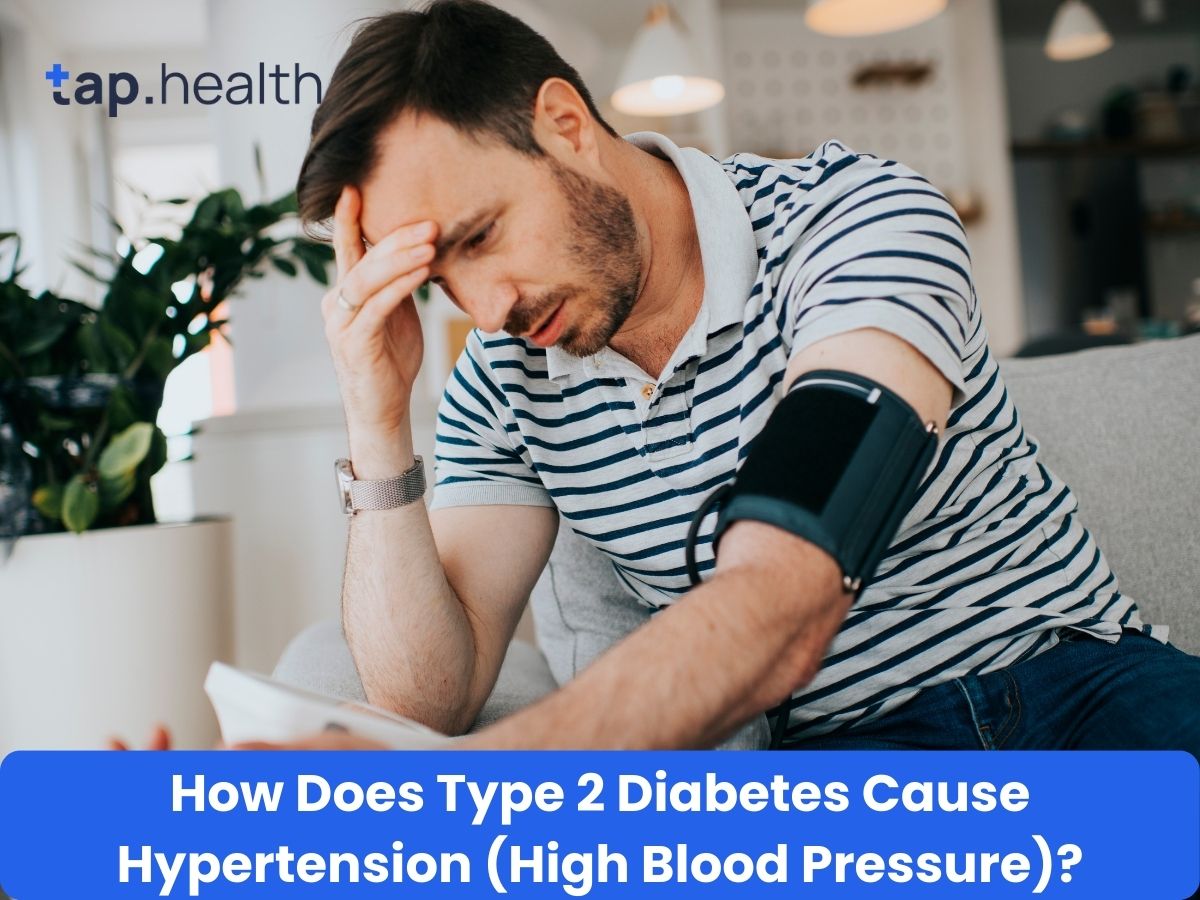Table of Contents
- Understanding Diabetes & Heart Attack Risk
- Diabetes and Heart Disease: A Dangerous Link
- Warning Signs: Recognizing Heart Attack Symptoms in Diabetics
- Preventing Heart Attacks with Diabetes Management
- Diabetes, Heart Attacks, and Lifestyle Changes: A Guide
- Frequently Asked Questions
- References
Living with diabetes significantly increases your risk of heart attack, a fact that often goes understated. Understanding diabetes and the risk of heart attack: symptoms & causes is crucial for proactive management and a healthier life. This blog post will delve into the intricate connection between these two conditions, exploring the shared risk factors and warning signs you should be aware of. We’ll break down the underlying causes and empower you with knowledge to better protect your heart health. Let’s get started on this essential journey towards improved well-being.
Understanding Diabetes & Heart Attack Risk
Did you know that women with diabetes face a significantly higher risk of heart disease? Studies show a 40% increased risk compared to men with the same condition. This stark reality highlights the critical need for understanding the intricate link between diabetes and heart attacks, particularly in Indian and tropical countries where diabetes prevalence is rising. This heightened risk underscores the importance of proactive health management.
Understanding the Connection
Diabetes, whether type 1 or type 2, damages blood vessels over time. This damage increases the risk of atherosclerosis, a condition where plaque builds up in the arteries, narrowing them and restricting blood flow. This reduced blood flow deprives the heart of oxygen, leading to chest pain (angina), shortness of breath, and eventually, a heart attack. High blood sugar levels also contribute to inflammation, further accelerating this process. In tropical climates, factors like high humidity and dietary habits may exacerbate these risks.
Symptoms to Watch For
Recognizing the symptoms of a heart attack is crucial. While chest pain is a common symptom, it can manifest differently in women, sometimes presenting as jaw pain, back pain, or shortness of breath. Other symptoms include nausea, vomiting, and dizziness. If you experience any of these symptoms, seek immediate medical attention. Early diagnosis and intervention are critical in mitigating the risk of severe complications.
Taking Control of Your Heart Health
Managing diabetes effectively is key to reducing heart attack risk. This includes maintaining healthy blood sugar levels through diet, regular exercise, and prescribed medications. Adopting a heart-healthy diet low in saturated and trans fats, rich in fruits, vegetables, and whole grains, is essential. Regular check-ups with your doctor, including blood pressure and cholesterol monitoring, are also crucial steps towards preventative care. In many Indian and tropical countries, access to affordable healthcare remains a challenge; therefore, proactive lifestyle changes become even more vital. Consult your doctor about managing your diabetes and reducing your risk of a heart attack. For more specific steps on protecting your heart, check out our article on Protect Your Heart from Diabetes: 5 Essential Steps. Understanding the connection between diabetes and obesity is also crucial; learn more in our blog, Understanding the Link Between Diabetes and Obesity.
Diabetes and Heart Disease: A Dangerous Link
Diabetes significantly increases the risk of heart attack and other cardiovascular diseases. This heightened risk is particularly pronounced in tropical and Indian climates, where lifestyle factors and existing health conditions can exacerbate the problem. The link between diabetes and heart disease is complex, involving several interconnected factors. For instance, high blood sugar damages blood vessels over time, leading to atherosclerosis, the buildup of plaque in arteries. This reduces blood flow, increasing the likelihood of a heart attack or stroke. Furthermore, individuals with diabetes often have other risk factors, such as high blood pressure and high cholesterol, which further amplify cardiovascular risks.
Understanding the Increased Risk in Tropical Climates
In regions like India and other tropical countries, factors like diet high in saturated fats and refined carbohydrates, combined with limited physical activity, contribute to the prevalence of both diabetes and heart disease. The added stress of heat and humidity can also put extra strain on the cardiovascular system. Research shows that these factors, when combined with diabetes, dramatically increase the risk of serious complications. Smokers with diabetes, for example, face a two-fold increase in mortality rates due to cardiovascular issues. This emphasizes the critical need for proactive lifestyle modifications and regular health checkups. It’s also important to understand the relationship between diabetes and other metabolic conditions, such as The Link Between Diabetes and Fatty Liver, which can further complicate heart health.
Taking Control of Your Heart Health
Managing diabetes effectively is crucial in mitigating the risk of heart disease. This involves maintaining healthy blood sugar levels through diet, regular exercise, and medication as prescribed by your doctor. Adopting a heart-healthy diet low in saturated and trans fats, rich in fruits and vegetables, and incorporating regular physical activity are essential steps. Regular checkups, including monitoring blood pressure, cholesterol, and blood sugar levels, are also vital. Prioritizing your heart health by addressing diabetes proactively is key to a longer and healthier life, especially in regions where the combined burden of diabetes and heart disease is significantly high. Consult your physician for personalized advice and support tailored to your specific needs and the climate you live in. While less directly related to heart health, it’s also crucial to be aware of the potential link between diabetes and other serious illnesses; for example, Does Diabetes Cause Cancer? explores this important connection.
Warning Signs: Recognizing Heart Attack Symptoms in Diabetics
Diabetes significantly increases the risk of heart attack, a critical concern in India and other tropical countries. Many diabetics experience atypical heart attack symptoms, making early detection challenging. Over 30% of diabetic patients have HbA1c levels above 9%, highlighting the widespread prevalence of poor blood sugar control and increased cardiovascular risk. This underscores the importance of recognizing the warning signs. Understanding the early signs of diabetes itself is crucial, as outlined in 10 Early Signs and Symptoms of Diabetes?.
Silent Heart Attacks
Unlike the classic chest pain depicted in many awareness campaigns, diabetics may experience a silent heart attack, characterized by minimal or no chest discomfort. Instead, look out for symptoms like extreme fatigue, unexplained shortness of breath, nausea, and upper back or jaw pain. These subtle signs can easily be dismissed, delaying crucial medical intervention. These symptoms are particularly common in older diabetic populations prevalent in many parts of India and other tropical regions. High blood sugar levels, such as those described in 750 Blood Sugar Alert: Critical Risks, Warning Signs, further increase the risk.
Recognizing the Emergency
The presence of any of these symptoms, even if mild or atypical, warrants immediate medical attention. Do not delay seeking help. Prompt diagnosis and treatment are crucial in minimizing the long-term consequences of a heart attack. In India and tropical regions, access to timely healthcare can be a challenge; proactive monitoring of your health and a heightened awareness of these symptoms is essential.
Taking Action
Regular check-ups, including HbA1c testing, are vital for managing diabetes and reducing the risk of heart attack. Maintain a healthy lifestyle with regular exercise, a balanced diet, and stress management techniques. This approach is particularly important in regions where lifestyle-related diseases are increasingly prevalent. If you experience any of the mentioned symptoms, seek immediate medical assistance. Your life depends on it.
Preventing Heart Attacks with Diabetes Management
Understanding the Link Between Diabetes and Heart Disease in India
Diabetes significantly increases the risk of heart attack, a critical health concern in India and many tropical countries. The alarming statistic that over 60% of people with diabetes in India also have hypertension highlights this dangerous connection. This dual burden necessitates proactive management to mitigate the risk of cardiovascular events. Effective diabetes control is paramount in preventing heart attacks. Regular monitoring of blood sugar levels, coupled with a healthy lifestyle, is crucial.
Practical Steps for Prevention
Managing diabetes effectively involves a multi-pronged approach. This includes maintaining a balanced diet low in saturated fats and refined carbohydrates, regular physical activity appropriate for your fitness level, and strictly adhering to your prescribed medication regimen. Regular check-ups with your doctor are essential to monitor blood pressure and cholesterol levels, key indicators of heart health. For individuals in India and other tropical regions, understanding the impact of climate and lifestyle factors on diabetes management is particularly important. For more detailed guidance on managing your diabetes effectively, check out our blog on 10 Proven Tips for Effective Diabetes Management.
Seeking Support and Resources
For reliable information and support regarding diabetes management in India, you can explore resources provided by organizations such as the International Diabetes Federation (IDF India). Early detection and proactive management are vital in reducing the risk of heart attacks for those living with diabetes in India and across tropical climates. Remember, taking control of your diabetes is a crucial step towards protecting your heart health. Managing cholesterol is also vital; learn more about How to Manage Cholesterol Levels with Diabetes?
Diabetes, Heart Attacks, and Lifestyle Changes: A Simple Guide to Protect Your Heart
Diabetes doesn’t just affect blood sugar—it also significantly increases the risk of heart attack. This is especially concerning in India and other tropical countries, where lifestyle factors make the problem worse.
According to the International Diabetes Federation, about 61% of people with diabetes are between 20–64 years old—the prime working-age group. This means the risk is hitting people in their most productive years.
Why Diabetes Increases Heart Attack Risk
High blood sugar, the main problem in diabetes, slowly damages blood vessels. Over time, this can lead to:
-
Atherosclerosis – a buildup of fatty plaque inside arteries.
-
Narrowed and hardened arteries – reducing blood flow to the heart.
-
Higher risk of blockages – which can trigger a heart attack.
In tropical regions like India, additional factors such as obesity, high blood pressure, and unhealthy diets make the risk even higher.
Lifestyle Changes That Can Protect Your Heart
Managing diabetes well is the first step to lowering heart attack risk. Here’s how you can do it:
-
Eat a Heart-Friendly Diet
-
Include fruits, vegetables, whole grains, and lean proteins.
-
Limit processed foods, sugary drinks, and saturated fats.
-
-
Move Your Body Daily
-
Aim for at least 30 minutes of brisk walking or moderate activity most days.
-
-
Maintain a Healthy Weight
-
Even a 5–10% weight loss can improve heart health.
-
-
Quit Smoking
-
Smoking plus diabetes is a dangerous combination for your arteries.
-
-
Manage Stress
-
Try deep breathing, yoga, or meditation to keep stress hormones in check.
-
Special Note for Seniors (65+)
Around 39% of diabetics are aged 65 and above, making them more vulnerable. In this age group, gentle exercise, balanced meals, and regular check-ups are especially important.
📌 See our guide: Managing Diabetes as You Age: Challenges and Solutions.
India & Tropical Countries: Adapting Lifestyle Changes
-
Choose local and seasonal fruits/vegetables for affordability and freshness.
-
Opt for traditional whole grains like millet, brown rice, and whole wheat.
-
Engage in accessible activities like walking, cycling, or yoga.
-
Consult a doctor or dietitian for a personalized, culturally appropriate plan.
Frequently Asked Questions on Diabetes and the Risk of Heart Attack
Q1. How much does diabetes increase my risk of a heart attack?
Diabetes significantly raises your risk of a heart attack, particularly for women and those living in tropical climates. High blood sugar damages blood vessels, increasing the chance of heart problems.
Q2. What are the symptoms of a heart attack in someone with diabetes?
Heart attack symptoms in diabetics can be different than in non-diabetics. While chest pain is common, you might experience fatigue, shortness of breath, nausea, or back/jaw pain. Seek immediate medical help for any concerning symptoms.
Q3. How can I reduce my risk of a heart attack if I have diabetes?
Effective diabetes management is key. This includes maintaining a healthy diet, exercising regularly, taking prescribed medications, and attending regular checkups. Lifestyle changes are especially important.
Q4. Are there specific challenges in managing diabetes and heart attack risk in tropical climates like India?:
Yes, diabetes and related risk factors are more prevalent in some tropical regions. Therefore, proactive lifestyle modifications and regular medical care are even more critical in these areas.
Q5. Where can I find personalized guidance on managing my diabetes and heart health?
Consult your doctor or a certified diabetes educator. They can provide tailored advice based on your individual needs and risk factors to help you create a plan for preventing heart attacks.
References
- A Practical Guide to Integrated Type 2 Diabetes Care: https://www.hse.ie/eng/services/list/2/primarycare/east-coast-diabetes-service/management-of-type-2-diabetes/diabetes-and-pregnancy/icgp-guide-to-integrated-type-2.pdf
- What is Diabetes: https://www.medschool.lsuhsc.edu/genetics/docs/DIABETES.pdf



